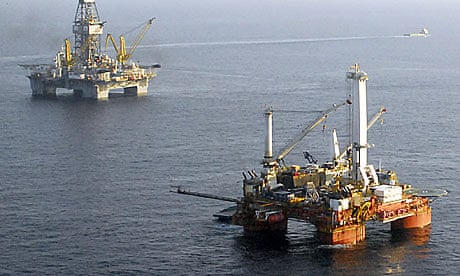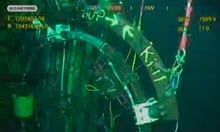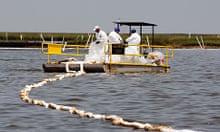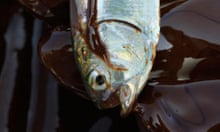BP hopes to carry out a crucial test later today in final preparation for sealing the ruptured well in the Gulf of Mexico, which scientists agreed last night has been responsible for the worst accidental oil spill in history.
Nearly 5m barrels of oil have gushed into the ocean since the Deepwater Horizon rig exploded and sank in April, according to federal scientists. That makes the spill larger than the 3.3m barrels released into Mexico's Bay of Campeche when the Ixtoc I oil rig suffered a catastrophic blowout in 1979.
At its peak, the BP well was spewing 62,000 barrels a day, according to the federal team, which is higher than the original worst-case scenario of 60,000. But by the time that BP was able to cap the well last month that figure had dropped to 53,000 a day.
The new estimate of the size of the spill – of a total of 4.9m barrels – means the potential penalty that BP faces under US law has ballooned. Under the Clean Water Act, BP faces a fine of $1,100 (£691) a barrel, or $4,300 a barrel if it is found that the spill was the result of gross negligence. As a result, BP could be fined either $5.4bn or $21bn. The federal team reckon BP's own containment efforts saved about 800,000 barrels which could be taken into account as a mitigating factor, reducing the fine to either $4.5bn or $17.6bn.
The largest oil spill in history came at the end of the first Gulf war in 1991 when retreating Iraqi forces destroyed countless Kuwaiti wells, which resulted in an estimated 1.4m to 1.5m tonnes of oil being released into the Persian Gulf. That spill is not, of course, counted as accidental.
In an attempt to finally close the Macondo well, BP engineers will today carry out a pressure test to see whether they can begin the so-called 'static kill' procedure, which involves pumping heavy drilling mud into the well.
If tests go to plan, BP will begin pumping mud into the well from a nearby ship loaded with 8,000 barrels of it. The plan is to slowly force the oil back down into the reservoir by steadily pumping in the heavier mud. If successful, BP will be able to either cement the well from the top, or wait until the relief wells – which are due to be completed later this month – have reached the correct depth and cement the well from the bottom.
Preparations for the "injectivity" test – which was delayed on Monday because of a small leak of hydraulic fluid in a control panel – come as it emerged BP has sent a bill for $480m to one of its partners in the well.
Japan's Mitsui, which has a 10% stake in the well through its unit Mitsui Oil Exploration, said overnight that it has received a bill for $480m from BP which it will "carefully" study but has yet to decide if it will pay any clean-up costs.
Last month it emerged that BP was looking to recoup some of the costs of the clean-up from Mitsui and Canada's Anadarko Petroleum, which has a 25% share in the well.
Anadarko has flatly refused to accept any blame for the disaster. In June its chairman and chief executive, Jim Hackett, said BP's actions probably amounted to "gross negligence or wilful misconduct".
Last month, BP announced that it had set aside $32.2bn to pay for the spill as embattled chief executive Tony Hayward announced plans to quit his job.







